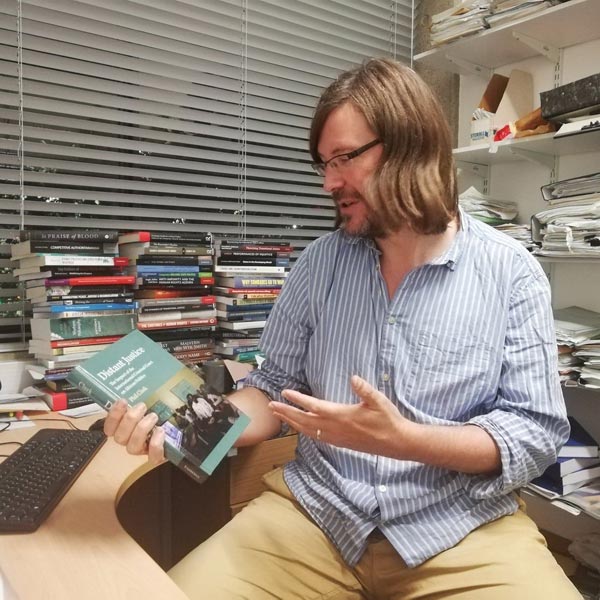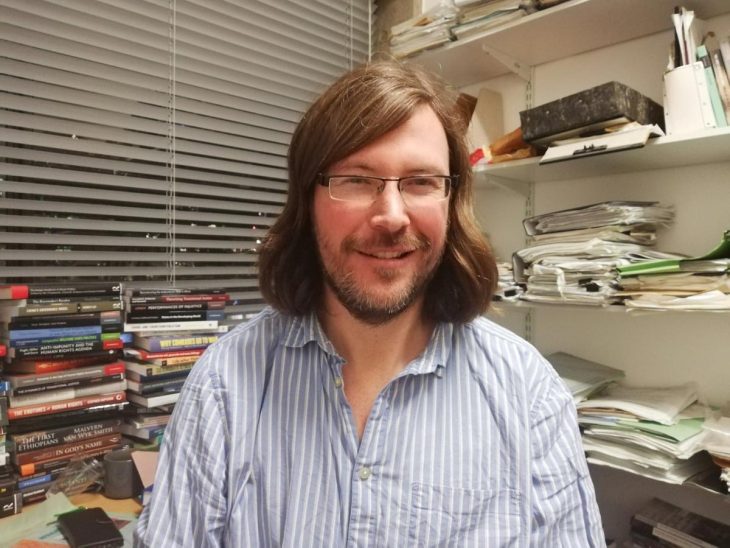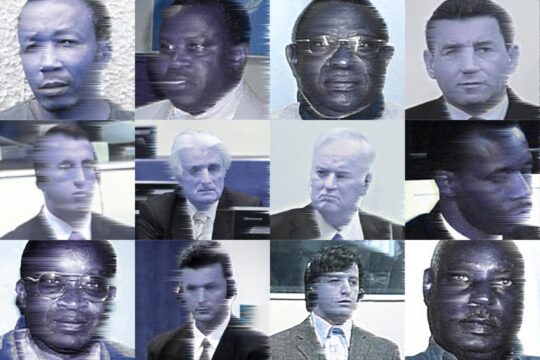JUSTICEINFO.NET IN-DEPTH INTERVIEWS
Phil Clark
Reader in Comparative and International Politics at London’s SOAS University
After a multi-year field research in Uganda and the Democratic Republic of Congo (DRC), Australian scholar Phil Clark recently published a book on the shortcomings of the International Criminal Court (ICC), providing “innovative” and “constructive” recommendations for a reform of the Court. As the ICC’s Assembly of State Parties meets in The Hague, from the 5th to the 15th of December, Clark discusses his most important findings and analysis.
Part 1: The ICC and Africa
JUSTICEINFO.NET: Your book is entitled "Distant Justice: The Impact of the International Criminal Court on African Politics". What do you mean by "distant justice"?
PHIL CLARK: Distant justice refers to the ICC's attempts to separate itself from the societies where it investigates crimes, to safeguard its neutrality. This includes delivering justice remotely from The Hague. The Office of The Prosecutor (OTP) has a protocol limiting its investigators to ten days at a time in the field, to ensure their security. These investigators – some of whom have spoken to me anonymously – express frustration at having to work in places where they don't speak the language or [don’t] have reliable networks of local informants, and where they interview witnesses who take great risks to speak to ICC staff. All of this is part of the ICC's idea of distant justice – failing to hire African personnel, including investigators with local knowledge, or to spend enough time grappling with the local context, to enable it to build effective criminal cases.
Distant justice makes the ICC unaccountable to conflict-affected communities and blind to the various negative consequences
Distant justice also refers to the ICC’s philosophy that justice requires hovering above the political fray, investigating and prosecuting individuals regardless of the on-the-ground consequences or the demands of the local context. This philosophy sees the local terrain as fundamentally corrupt, a pollutant from which the ICC needs to insulate itself so that it can remain impartial.
The idea of distant justice clashes with the way the ICC prefers to portray itself through the principle of complementarity, which frames the Court as a back-stop institution to national processes and respectful of national sovereignty.
My book argues that all of these components of distant justice make the ICC unaccountable to conflict-affected communities and blind to the various negative consequences the Court has produced on the ground.
Has proximate justice been more effective, then?
Yes. In different parts of Africa in the last ten or fifteen years, various kinds of proximate justice have proved to be effective. We can look at the Gacaca process in Rwanda, which has been controversial and imperfect, but it showed that it was possible to do justice in a different way, that you could have village trials prosecuting hundreds of thousands of every-day suspects and to do it in a way that was accessible to local people. But also – and this is especially important for the ICC – national courts, in various African states, have proven highly effective at dealing with serious atrocity crimes in courtrooms that are also accessible to communities affected by conflict.
Involvement of the ICC in Africa
In this video clip, Phil Clark explains that "the ICC needs to start to back-off from intervening in african conflicts zones."
I would cite the example of the Ituri courts in north-eastern DRC [Democratic Republic of Congo]. These courts – which are imperfect in many ways – have a track record of dealing with cases of crimes against humanity, including cases that involve middle and high-ranking members of the Congolese army. These investigations are being carried out by Congolese investigators, the trials are conducted by Congolese judges, in a language, in a legal form and in locations that are comprehensible to local people.
In your opinion, what are the other ICC's limits that impede successful prosecutions?
The Court – especially the Office of the Prosecutor (OTP) – has so far struggled to gather effective evidence and to build effective cases because it has a tenuous grasp of complex conflict situations in Africa. As a result, more ICC cases have either collapsed before or during trial than have resulted in completed trials.
Could you cite any ICC's success?
The ICC’s successes since its inauguration in 2002 are scant. Perhaps the ICC’s greatest success to date is that it exists at all – that enough countries around the world signed up to create this permanent global Court.
Perhaps the ICC’s greatest success to date is that it exists at all
However, the Court’s first 16 years suggest that it needs to do much more to become effective and globally respected.
The ICC is failing to effectively prosecute people in power. It's only been able to prosecute rebel leaders, state actors who become vulnerable and go into exile. How do you explain it?
The ICC relies fundamentally on cooperation with states, including those accused of committing serious crimes. The Court has no police or military branch capable of providing security to its investigators in the field or enforcing arrest warrants – all of which it seeks from state actors.
On top of this, the ICC has developed very cosy relations with governments such as those of Uganda and the DRC. In my book, I lay out how those relations unfolded and how assurances were made that government suspects wouldn’t be investigated in those countries in exchange for state cooperation throughout the ICC’s investigations. This means that the ICC is structurally incapable of effectively investigating and prosecuting sitting members of government. It is only a Court for addressing atrocities committed by non-state actors such as rebel leaders or deposed political leaders.
Assurances were made that government suspects wouldn’t be investigated in those countries in exchange for state cooperation
Because the Court has only gone after non-state actors, it’s also further entrenched these governments because they are able to use the Court as a weapon against their military and political opponents.
For example, in Uganda, the ICC has only gone after the LRA [Lord’s Resistance Army, a rebel group] and not Museveni's government. In the DRC, the Court has gone after the likes of Jean-Pierre Bemba, the major political opponent to Joseph Kabila.
The message this sends to political and military elites around the world is that if you cling to power, you can protect yourself from prosecution. If you lose power – as former DRC Vice-President Jean Pierre Bemba, or former rebel leader and former member of the Central African Republic parliament Alfred Yekatom did – then you become vulnerable to being sent to The Hague.
Some have claimed that the ICC acts as a neo-colonial actor in Africa. What is your opinion?
I’ve never fully bought the argument of the ICC’s neo-colonialism, which frames the Court as an all-powerful actor targeting poor, defenceless African states. Instead, the Court has proven to be a weak institution that has been all too easily manipulated by African governments, including those of Uganda and the DRC.
I’ve never fully bought the argument of the ICC’s neo-colonialism, which frames the Court as an all-powerful actor targeting poor, defenceless African states.
Nevertheless, the ICC was politically naïve to focus singularly on African conflicts and African suspects for its first 14 years of operation (only in 2016 did the Court open its first non-African situation in the Georgia-Russia conflict). This left the Court open to this criticism of being a neo-colonial meddler in African affairs. Given Africa’s fraught history with all manner of international interventions – including by colonial powers, the World Bank and IMF [International Monetary Fund] structural adjustment policies, foreign donors, UN peacekeeping missions, etc. – it was inevitable that the ICC would be seen as the latest in this long line of damaging outsiders.
Why have some African states threatened to withdraw from the ICC?
African states have myriad motivations for threatening to withdraw from the ICC. Some states simply want to protect their own leaders from prosecution. Others are worried more broadly about the impact of an unaccountable international court meddling in their affairs.
Some African states are also concerned that the Rome Statute limits their flexibility in responding to mass crimes in their own ways. For example, if South Africa wanted to use a truth and reconciliation commission that granted amnesties today – as it did after 1994 to deal with high-ranking suspects from the apartheid era – it would be almost impossible to do so under the strictures of the ICC. The Court and its backers would demand that South Africa prosecute these suspects, regardless of the impact on the kind of complex political negotiations that led to the 1994 transition.
Why the threat of several countries, including Kenya and South Africa, to withdraw from the Rome Statute has only been followed up by Burundi?
Because of the ICC's reliance on state cooperation, African governments have worked out they can use the Court to target their military and political opponents, while protecting themselves from prosecution. This is a major reason that only a handful of African states have threatened to withdraw from the ICC. Many African states like to have the ICC around in case they need to use it as a weapon against their opponents.
Many African states like to have the ICC around in case they need to use it as a weapon against their opponents.
Cooperating with the ICC is also useful for their international image. The Ugandan government, for example, has become increasingly critical of the ICC while continuing to use it against the LRA rebels. This is vintage behaviour from the Museveni government – to lambast international actors while using them for its own political ends.
Part 2: Lessons from Uganda and the DRC
Why did your research work focus on Uganda and the DRC?
The book focuses on these two situations because they were the first and most developed of those covered by the ICC, providing six out of its ten completed cases. This allows an in-depth examination of all aspects of the ICC’s work – from the launch of investigations, the Court’s community outreach strategies, negotiations with domestic political and judicial actors and the conduct of trials and their aftermath. All of these different features of the ICC’s operations have had marked effects on the political and social landscape in Uganda and DRC.
What are the major negative consequences produced by ICC’s intervention that you have identified?
The first is political. I argue that – especially in Uganda and DRC – the ICC has emboldened these governments which are already highly corrupt and violent towards their civilian populations. The ICC has encouraged this kind of state behaviour by developing such close working relationships with these governments. It has conducted its investigations in lock-step with the two states. My interviews suggest there were deals done behind the scenes to ensure there would not be investigations into government crimes in either Uganda or Congo.
The consequence is that these governments have no hesitation in continuing to commit these kinds of crimes because they think: “If the ICC, as the major international body looking at us, scrutinising us, isn’t going to investigate us, then there is no deterrent.”
My interviews suggest that there were deals done behind the scenes to ensure there would not be investigations into government crimes in either Uganda and the DRC.
The Court has also produced a range of negative legal consequences. In particular, in my view, it has stolen cases that should have been prosecuted by domestic institutions. The main example is what happened in Ituri, in the DRC, where the domestic courts were investigating a series of Congolese rebel leaders who were subsequently whisked off to the Hague for prosecution. This has demoralised the national judiciary, which had undergone a major reform process, felt that it was capable of dealing with these serious cases and could point to a track record of doing so.
There is a huge amount of frustration within the national courts, that they have been unable to deal with these cases. This does a massive disservice to national judiciary in various parts of Africa.
You have claimed that ICC’s interventions have resulted in the disruption of fragile peace deals. Could you cite an example?
The most concrete example is the Ugandan peace process between 2006 and 2008, between the Ugandan government and the LRA. The ICC had issued arrest warrants for five LRA commanders about two years before the Juba process began. During the peace talks there was a continuous call [from] the LRA delegation either to drop the arrest warrants altogether, or to pause the ICC investigations for one year renewable – which is permissible under the Rome Statue – to see whether the peace talks would produce a positive outcome. The ICC refused to do that and insisted that, even if the peace process was under way, it needed to prosecute these individuals. What that meant was that the ICC totally dominated the two years of those talks. Almost every single issue was negotiated in the shadow of the ICC’s threat.
In my interviews in Juba at the time of the talks, with many of the key actors, it was clear that the parties were not making significant progress on most of the difficult issues in the negotiations because they were spending so much time dealing with the ICC question. There are a lot of reasons that the talks ultimately collapsed, but certainly it did not help that the ICC was hovering above the process.
One of the practical consequences of the ICC’s intervention was that none of the LRA commanders themselves were at the negotiating table.
One of the practical consequences of the ICC’s intervention was that none of the LRA commanders themselves were at the negotiating table. That weakened the whole process, because it meant that the rebel leadership was having to act through intermediaries and the government side were never sure that the deals being done at the table had the approval of Joseph Kony, Vincent Otti and others who were in the bush.
The other major problem in Juba, was that the ICC thwarted the possibility of using an amnesty for high level suspects even though at the time the LRA leadership was eligible for an amnesty under Ugandan law. It meant that the negotiators were denied one of the major incentives to achieve peace. That limited the avenues the negotiators could go down to get a final agreement.
The Uganda case really underlined how interfering the Court can be when peace is being negotiated and the ways in which it hampers flexibility and creativity during peace talks.
How do you see the simultaneous opening of the Dominic Ongwen trial at the ICC in The Hague and the Thomas Kwoyelo trial in Gulu?
What’s most important about these simultaneous Ugandan trials is that the latter, for all its faults, shows that the Ugandan national courts are capable of addressing major atrocity cases.
It has taken too long for the Kwoyelo trial to start and there are still outstanding legal questions over why he doesn’t qualify for an amnesty under Ugandan law. But the fact that he’s being prosecuted before the functional International Crimes Division of the Ugandan Supreme Court shows that Uganda possesses a court that could also handle Ongwen’s case. Some Ugandan judicial actors are currently saying the same – that Ongwen should have been sent to Uganda rather than The Hague for trial and that it would’ve given a major boost to the domestic judicial system (which has undergone major reforms over the last decade) to prosecute such a high profile suspect.
The Ugandan government knows that it has successfully manipulated the ICC to ensure Ongwen’s trial involves no evidence that points back to state crimes committed in northern Uganda.
The key, though, is that the Museveni’s government believed its interests were better served by sending Ongwen to the ICC than prosecuting him domestically. The Ugandan government knows that it has successfully manipulated the ICC to ensure Ongwen’s trial involves no evidence that points back to state crimes committed in northern Uganda. In contrast, a domestic trial conducted by a reformed judiciary in a febrile national environment may produce results the government doesn’t want. The Ugandan government couldn’t take that risk.
Part 3 : Recommendations
It is mainstream now to criticize the ICC. What is the new perspective that you offer?
A lot of criticism of the Court up until now has been very general. Things like the Court being a neo-colonial actor in Africa, just to pick one. What my book does is get on the ground much more systematically, at both the national and the community levels, in Uganda and the DRC, to look at the various ways in which the Court is intervening and creating all sorts of political and social problems. In response, the conclusion to Distant Justice sets out quite an ambitious reform agenda for the ICC.
The starting point is attitudinal – the ICC needs to be more humble and more deferential to national actors, especially in light of a new wave of energetic national courts across Africa. These are often handling more serious cases than those tackled by the ICC, including cases involving government actors – a category the ICC has proven incapable of handling.
The ICC also needs to be willing to back off during delicate peace negotiations and other domestic responses to mass conflicts.
The ICC also needs to be willing to back off during delicate peace negotiations and other domestic responses to mass conflicts, such as truth commissions and combatant demobilisation programmes. It should only intervene in the most exceptional cases. It may mean taking a back seat to processes that the Court itself doesn’t particularly like – such as amnesty processes – and allowing states and local actors to use community-based approaches if those processes are deemed to be more effective in the local domain.
For example, I see no compelling reason why – as some Acholi actors argued during the Juba talks – Joseph Kony shouldn’t have been dealt with through community-based rituals in northern Uganda rather than the ICC.
The Court needs to take local context more seriously, by hiring nationals from the countries where it investigates crimes; to learn more about national law and politics before ploughing in; to listen more to the needs and concerns of conflict-affected communities ; and to hold trials in the same locations where atrocities were committed, rather than in The Hague.
 PHIL CLARK
PHIL CLARK
Phil Clark is Reader in Comparative and International Politics at SOAS University of London. He specialises in conflict and post-conflict issues in Africa. His work puts particular emphasis on community-based approaches to accountability and reconciliation and the law and politics of the International Criminal Court (ICC). His new book "Distant Justice: The Impact of the International Criminal Court on African Politics" was published in November 2018 by Cambridge University Press.






